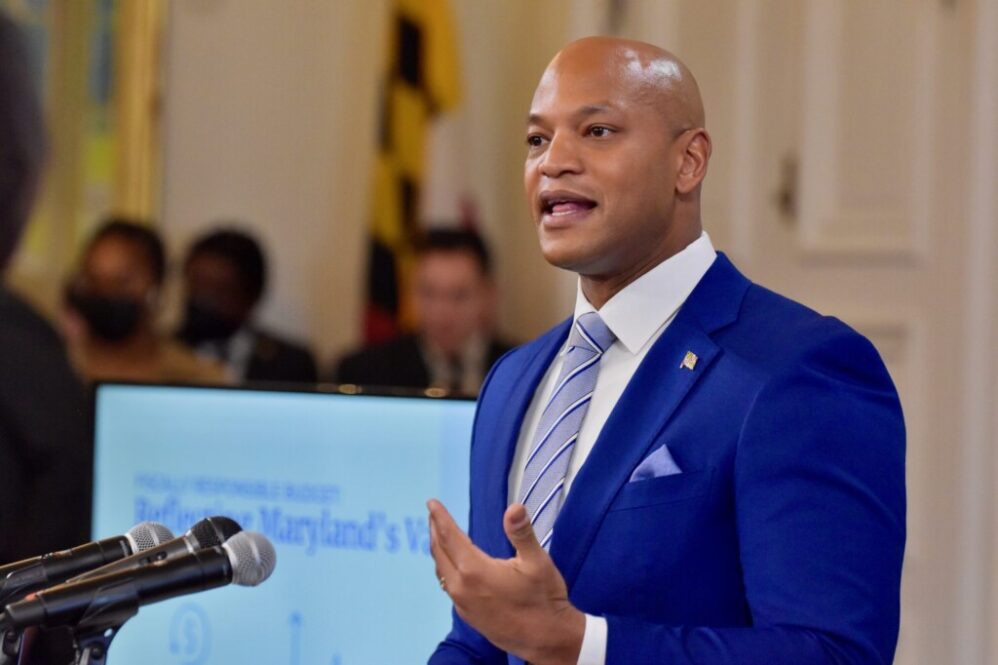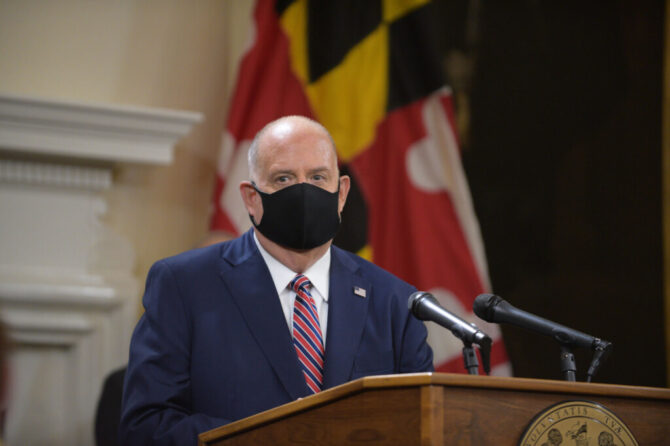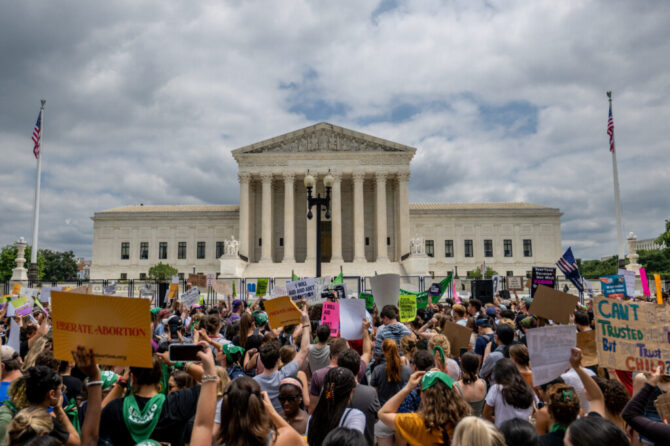MARYLAND MATTERS: Gov. Wes Moore (D) unveiled a new spending plan Wednesday that he said provides additional funding for public safety, child care and raises for employees, as well as staving off some cuts to transportation projects.
Moore and his Budget Secretary Helene Grady said the fiscal 2025 proposal protects core priorities and attacks a growing structural deficit without the need for tax increases. But Moore and Grady said the proposed budget “rebases” spending at several agencies and programs to pre-pandemic funding levels, including aid for students attending community and private four-year colleges.
“We will make Maryland safer. We will make Maryland more affordable. We will make Maryland more competitive,” said Moore. “And we will continue to make Maryland the state that serves and we will achieve each of these goals without raising taxes on Marylanders.”
In general, lawmakers offered positive comments on the $63.1 billion plan that includes $25.8 billion in General Fund spending. The comments were based on a budget overview presented to them by Moore over breakfast Wednesday morning.
“I think this budget has some things to like, including full funding of the Blueprint,” said House Appropriations Chair Ben Barnes (D-Prince George’s and Anne Arundel).
Moore is required by law to fully fund K-12 education.
Barnes said the plan sidesteps thornier issues involving projected structural budget deficits and more than $3 billion proposed cuts to transportation over six years.
“It does ignore some of the long-term issues of funding for things like the Blueprint and transportation,” said Barnes. “I think that is something that we should not put off until tomorrow. These are things that Marylanders are expecting us to solve now and things we need to get to work on this session.”
Senate Budget and Taxation Chair Guy Guzzone (D-Howard) called the proposed budget “a very solid start.”
“We’re going to have to deal with issues we’ve previously suggested we fund at different levels,” said Guzzone, noting Moore’s cuts to some higher education programs. “It’s the beginning of having those discussions about the long term.”
The proposal even received some early positive comment from Republicans happy with the absence of proposed tax increases.
“It seems like a fiscally responsible budget this year,” said Del. Jefferson L. Ghrist (R-Upper Shore). “We just got an overview. Over the next couple of weeks, once we start diving into the budget, we’ll see if there is any devil in the details.”
Bolstering aid to child care
Overall, Moore’s fiscal 2025 budget weighs in about a billion dollars less than the current year.
Moore and Grady said the administration plans to adjust the current year budget to make cuts to some areas and increasing funding to other programs, including a $218 million increase to bolster the state’s child care scholarship program for pre-kindergarten students.
The adjustments, made through legislation, will allow the administration to close a $1 billion projected cash deficit and reduce a projected structural budget deficit by 34% from $761 million to $502 million.
That move is in line with recommendations made in December by the legislature’s Joint Spending Affordability Committee.
Looming in the out-years of a five-year budget forecast are deficits that balloon to $2.7 billion by 2029.
Much of that is caused by spending spikes tied to education reforms in the Blueprint for Maryland’s Future.
“So, I think we’re able to show that we could still make big investments in things like childcare … things like housing, and also still shrink the structural deficit,” said Moore.
Other investments include $127 million to local law enforcement, a $5 million increase, and $10 million to create the new Center for Firearm Violence Prevention and intervention within the Department of Health.
“We also need to confront the inexcusable fact that 75% of homicides in our state are committed with a gun,” said Moore. “This is a public safety crisis. This is also a public health crisis.”
His budget also includes an additional $16 million for the Department of Juvenile Services.
“It’s going to help to ensure that we can stop the cycle of crime in our communities,” he said.
Moore also proposes increasing aid for affordable housing, including $110 million for rental housing.
His expansion of aid for child care scholarships will include an additional $270 million in fiscal 2025. That is on top of the $218 million for the current year that he is asking the legislature to approve.
Moore called it “the largest single year investment in child care” in the history of the state.
The governor said he will look to make the state more business friendly by introducing legislation to “streamline the permitting process to reduce regulatory red tape and to direct investments towards the industries of the future.”
Additionally, he proposed earmarking $100 million for the new FBI headquarters planned for Greenbelt.
Moore’s budget includes an increase for the Maryland Corps and Service Year Option within the Department of Service and Civic Innovation. The additional money would allow Moore’s signature program to increase the number of participants from 280 to 500.
State employees will also see a raise that includes cost of living and longevity increases at a cost of about $400 million.
Finally, Moore included $150 million from the state’s rainy day fund that will stave off cuts that were part of a $3.3 billion reduction in proposed transportation funding over six years.
The move is a one-time fix and some lawmakers including Barnes said there is an urgent need to resolve long-term transportation funding issues this year.
Currently, the state has $2.5 billion in reserve — about 10% of state expenditures. The amount is about twice that required by law to be held in reserve.
Even after tapping the fund, Moore and Grady said they will leave more than $2.3 billion in the emergency account.
No tax increases but some “rebasing” of spending
The governor signaled a reluctance to address budgetary challenges with taxes, though some Republicans complained that he is moving to increase fees in some agencies.
Grady, the state budget secretary, said Maryland families “are still managing the shock of the steep inflation that we experienced through 2021 and midway through 2022 in their household budgets. This has directly informed the governor’s position against raising taxes at this time.”
Grady added that the state needs to focus on population growth as one part of a broader strategy to grow the state’s economy.
Moore was reluctant to discuss cuts to programs, euphemistically referring to reductions as “rebasing” budgets.
“If you are the CEO of a company and your business is not growing then maybe it is time to rethink your business model. It will not be enough to simply rebuild state government,” said Moore. “We need to refocus state government. This budget is an important step in order for us to achieve that long term goal and taking it in a fiscally responsible way and a fiscally responsible way that the people obviously have become accustomed to with this administration.”
Lottery agents who saw a bump in fees paid by the Maryland Lottery and Gaming Agency will see reductions back to pre-pandemic levels, Moore said as an example of “rebasing.”
In another example, state aid to students at 13 private colleges through the Joseph A. Sellinger grant program will also be reduced under Moore’s proposal. The program has grown exponentially from roughly $59 million in fiscal 2020 to about $130 million in the current year. The Moore administration also hopes to focus future grants to undergraduate students.
Moore also will seek to “rein in” spending that is part of the Cade funding formula for community colleges around the state. Senior administration officials said the increases annually have grown while the number of students over the last decade has decreased.
Moore said the money, driven by federal aid during the pandemic, created an unsustainable long-term budget problem.
“So, there is a rebasing that we had on a few different state programs that we think are still showing our measurement of being aggressive, yet at the same time dealing with current economic problems,” Moore said.










